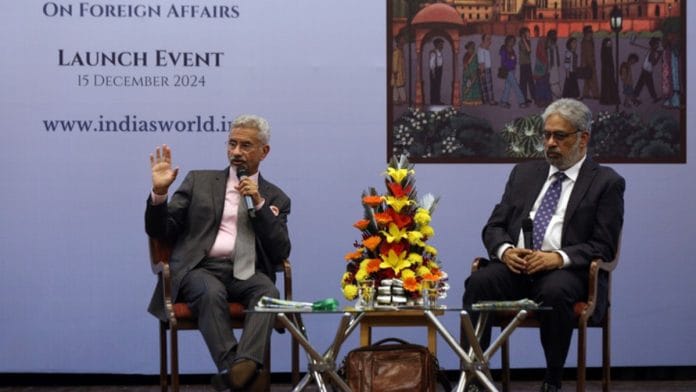New Delhi: Energy resources will become the cornerstone of India-Russia ties as New Delhi’s economic trajectory of around 7-8 per cent growth for decades to come will necessitate such an evolution, External Affairs Minister S. Jaishankar said Sunday. He added that ties between India and the US will continue to deepen even if both sides do not see eye to eye on every issue.
“A country like India at this stage of its growth, just think if you are today $4 trillion, and we are saying, okay you have 7-8 per cent growth for decades ahead of us, who would be our crucial partners in the world? I think to a large extent the major resource powers in the world. India’s economic trajectory will put a certain premium on countries like Russia or Indonesia, or Australia, or Brazil or even Canada,” Jaishankar said at the launch of ‘India’s World’, a new bi-monthly magazine.
He added that the logic behind choosing India’s partners would no longer be limited to countries “who are nice” to New Delhi, but would require a new rationalisation in the years to come.
In conversation with C. Raja Mohan, visiting professor at the National University of Singapore’s Institute of South Asian Studies, Jaishankar looked at India’s future ties with the US, China, Russia and Europe during the launch of the new bi-monthly magazine at the India International Centre here in New Delhi.
Jaishankar is clear that there exists a “unique” relationship between Moscow and New Delhi, because of the history, however, going forward its energy resources would be a key to deepening the relationship—indicating a shift to the importance of economic diplomacy for India.
“If you take for example the broad foreign policy establishment, not just the government but the bigger thinking in the country, for a variety of reasons there was a sharp anti-Western tinge to it. Look at the reality, who are your major trade partners, who are your major technology partners, where do many of the people go for education…where does much of your investment come from? All that points in one direction and sometimes the foreign policy points in a different direction,” said Jaishankar.
The external affairs minister added: “Today I would argue that one of the changes is that the economic side, the security side, the orthodox foreign policy and diplomacy side is much more tightly integrated and their decision is much more cohesive than it has been in the past.”
‘Have frank conversations with the US’
While pointing to how India’s partnership with Russia is evolving through its economic dimension, the external affairs minister also highlighted how, while New Delhi and Washington D.C. may not always see eye to eye on every issue, their relationship will continue to deepen.
“The US is a global power, it has interests of various kinds. We are a country where there has always been a strong regional dimensional, but it is not growing. In our own region there will be issues and relationships on which there will be intersections and convergences with the US and there would be some where there would not be,” said Jaishankar.
He added: “We have very honest conversations on where we agree and where we do not. That relationship between India and the US is such an important and large relationship. We factor these conversations but keep advancing that [overall] relationship.”
There have been a number of incidents in the last year that have tested the deepening partnership between India and the US, including a foiled murder-for-hire plot against a US citizen on American soil, as well as Indian companies facing sanctions by American authorities for their continued trade with Russia.
Jaishankar, while pointing out that transparency is required to an extent with regards to diplomacy, it must not involve putting “everything” out there when it comes to diplomatic conversations.
“Every government today tries to put out its version, its narrative. To that extent, yes, but then there is the compulsion of diplomacy. You cannot conduct diplomacy by putting everything out there in the open. Because then what could happen will never happen because it became difficult even before it started,” said Jaishankar.
(Edited by Gitanjali Das)
Also Read: India-Russia defence ties are waning. Crude oil supply is the centerpiece of relationship






